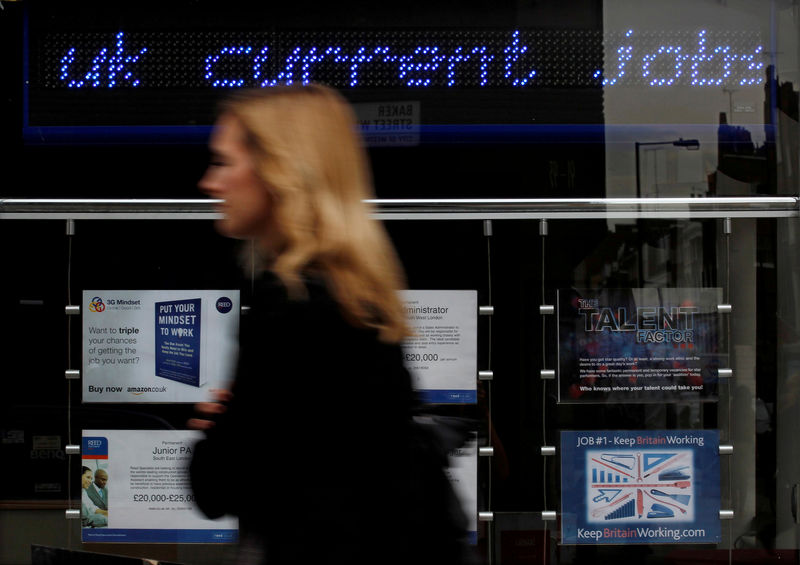By Andy Bruce and David Milliken
LONDON (Reuters) - Britain's labor market showed unexpected strength in the second quarter but economists said this could prove a high water mark, after figures last week showed the economy contracted as businesses braced for a potentially disruptive Brexit.
Average weekly earnings rose by an annual 3.7% in the three months to June - the highest rate since June 2008 and up from 3.5% in May. Excluding volatile bonuses, annual pay growth reached 3.9% - also an 11-year high and beating economists' average forecast in a Reuters poll.
The jobs market has been a silver lining for the economy since the Brexit vote in June 2016, something many economists have attributed to employers preferring to hire workers they can later lay off rather than making longer-term commitments to investment.
Britain created a net 115,000 jobs in the second quarter, the Office for National Statistics (ONS) said, almost twice the gain forecast and taking the level of employment to a record 32.811 million.
"The jobs market remains a source of strength for the UK economy, though it may now be reaching its peak," said Tej Parikh, chief economist at the Institute of Directors.
Sterling showed little reaction to the data, which tend to lag broader trends in economic growth and also appeared healthy more than a decade ago when Britain was beginning to slide into recession during the financial crisis.
Finance minister Sajid Javid said the data showed the fundamental strength of Britain's economy before it is due to leave the European Union on Oct. 31, with or without a deal to smooth the transition.
But some details in the labor market data pointed to tougher times ahead, after data last week showed the economy unexpectedly shrank by 0.2% in the three months to June, the first decline since 2012.
Part-time jobs and workers aged over 50 accounted for the entirety of the net increase in employment during the second quarter, while the jobless rate rose to 3.9%, against expectations for it to hold steady at 3.8%.
Older workers have driven the vast majority of jobs growth in recent years, reflecting in part the rising age at which people can claim state pensions.
PRODUCTIVITY STILL POOR
Output per hour, the headline measure of productivity, fell 0.6% in annual terms - the fourth quarter of decline in a row and the longest such run since mid-2013.
Poor productivity is one of Britain's biggest economic challenges and, until recently, had contributed to a decade of weak pay growth.
"If the UK leaves the EU without a deal on Oct. 31, business investment is likely to suffer, with worrying implications for productivity," said Howard Archer, chief economic adviser to the EY ITEM Club consultancy.
The number of job vacancies, an indicator of the potential for future employment growth, inched down to 820,000 in the three months to July from 824,000 in the period to June, the lowest level in more than a year.
Recent private-sector surveys of companies have also suggested employers are turning more cautious about hiring as the risk of a disruptive no-deal Brexit rises.

The Bank of England said this month it saw signs of a softening in labor market indicators.